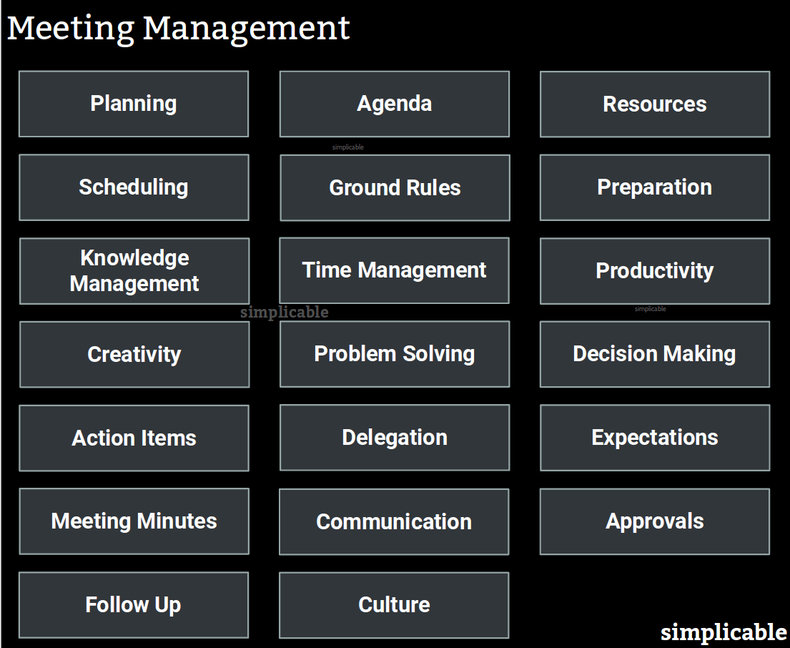

Planning
Setting objectives for a meeting and planning meeting structure, content, attendees and roles.Agenda
Preparing and communicating a meeting agenda that outlines the meeting objectives and topics that will be covered.Resources
Securing resources for a meeting such as a room and required equipment.Scheduling
Determining an appropriate time when attendees are available, sending out an invitation and collecting responses to finalize a schedule.Ground Rules
Establishing ground rules for meetings such as prohibiting the use of mobile devices or asking people to prepare.Preparation
Preparing for a meeting by researching information and creating visual aids and other helpful items such as checklists.Knowledge Management
Capturing any knowledge generated by a meeting. For example, documenting a diagram prepared in a meeting and checking it in to a knowledge management system.Time Management
Applying time management techniques to make good use of time. For example, time boxing topics and decisions to avoid spending too much time on a single problem.Productivity
Leading a meeting to make sure it remains productive. For example, allowing a single topic to take up an entire meeting if a conversation is producing value. Rigid adherence to an agenda or time management rule seldom makes sense. As such, meetings benefit from a leader who can break the rules as required.Creativity
Applying creativity techniques to improve the inventiveness of meeting outputs. For example, beginning a meeting with a game that forces people to apply divergent thinking.Problem Solving
Using formal problem solving techniques such as root cause analysis.Decision Making
Applying decision making techniques such as a decision balance sheet.Action Items
Identifying things that need to be done and assigning this work to meeting participants.Delegation
Delegating work or decisions. For example, if a team can't make a decision assign the decision to the individual closest to the situation.Expectations
Managing and setting expectations. Managing expectations involves communicating what will be done and what will not be done. Setting expectations involves specifying what is expected of an action item.Meeting Minutes
Capturing anything that occurred in a meeting that might be of interest to the future such as decisions that were made.Communication
The process of communicating before and after a meeting including schedule, agenda, ground rules, meeting materials and meeting minutes.Approvals
In some cases, meeting participants are asked to approve meeting minutes. This creates an audit trail for decisions and action items.Follow Up
Following up on any action items generated by the meeting.Culture
Teams that have ongoing meetings seek to embed elements of meeting management into the norms, expectations and habits of the team. For example, meeting ground rules can be established as a norm such that they don't need to be communicated for every meeting.| Overview: Meeting Management | ||
Type | ||
Definition | The process of directing and controlling meetings. | |
Related Concepts | ||






































